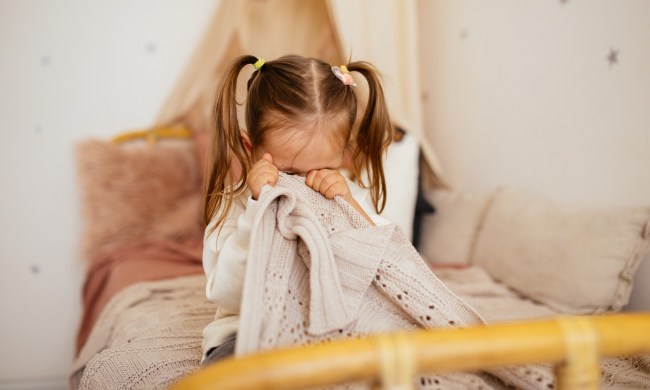Scrub-a-dub-dub, look at that baby in a tub! Yes, it’s time to splish, splash, and get that little nugget of yours so fresh and so clean. But first, you will need all the essentials to make Baby’s bath easy, refreshing, and fun. From a freestanding infant bath tub to rubber-ducky toys to the softest silicone skin brush to hooded towels, we’ve rounded up all the best bath accessories for your sweetie-pie’s next soapy, sudsy soak. There’s nothing cuter, sweeter, or bubblier than an itty-bitty getting dipped, wiped, and washed — and, with some help from a few nifty products, this wet but not-so-wild routine is sure to become your favorite part of the day. Bath time really is the best time!
Boon SOAK 3-Stage Bathtub
The first thing you’re going to need to successfully bathe your baby is a tub. (Didn’t see that one coming now, did you?) Yes, you can use the kitchen sink and eventually a full tub, but while your infant is still young and little, it’s helpful to have a smaller, angled space for bathing. The Boon SOAK bathtub features three stages (positions) to accommodate newborns, infants, and toddlers. We love a product that grows with Baby; you can keep and use it for longer — and, ultimately, save money. It can fit across most sinks, so you can fill it up easily, and the nonslip material helps keep your baby comfortably secure.
Munchkin Bubble Bath Spout Cover
When Baby graduates from a freestanding bath basin to the big bathtub, you will find that a spout cover is a nifty addition to your setup. This one fits over most bathtub faucets and serves to protect your baby from head bumps, bruises, and even burns. It stays in place as you run the water, and this adorable Munchkin duck cover option also has a built-in dispenser for a bubble bath.
Mustela Gentle Cleansing Gel and Baby Hair Wash
There are so many different cleansing gels and shampoo products that claim to be designed specifically for infants; it can be hard as a new parent to determine which one to try. Start by finding a hypoallergenic formula that is free of parabens, phthalates and phenoxyethanol. Mustela’s tear-free wash is made with 90% plant-based ingredients, so it’s gentle but effective. It will keep moisture and natural oils locked in, and it will leave your little one’s skin looking and feeling supple and soft. Of course, if your baby prefers a bath full of bubbles, you can also opt for a gentle soak to provide a foamy and fun play scene.
Skip Hop Waterfall Rinser
Take our word for it: A simple cup will not do. When you are pouring water over your little one’s head, you’ll want a rinser that is designed to mitigate meltdowns. The inside of the whale pourer helps encourage a steady flow so that you can get the job of rinsing a sudsy head faster. What’s more, the yellow rubber lip hugs your baby’s forehead to stop water from going into their sensitive eyes. Dishwasher safe and mold-resistant, this super-simple accessory can help ensure that bath time remains a tear-free affair.
FridaBaby DermaFrida SkinSoother Silicone Brush
You can skip washcloths altogether in favor of this simple silicone-bristled brush. It features cleansing massage beads that stimulate skin and even relax Baby during a pre-bedtime bath. What’s more, it can work wonders on your little one’s scalp. If they have cradle cap, this nifty tool will help to gently remove all that excess dry skin. It’s a great for eczema, too. Of course, if your baby is blessed with a head full of luscious locks, you should also consider having a soft-bristled brush or comb to manage that mini mane of theirs.
Growsland Baby Bath Toys
Who said that bath time should be all business and no play? A few fun and versatile bath toys — from squeaky and squishy creatures to waterproof books — will keep your baby entertained while you go about your business scrubbing, shampooing, and rinsing. If you obtain a lot of bath toys, consider getting a storage system that hangs and drains (to deter mold and mildew) for both convenience and cleanliness.
Baby Aspen Hooded Towel
Regardless of whether your baby loves or hates the bath, the hardest part of wrapping up a soak can be, well, wrapping up your baby. Their little bodies quickly become accustomed to the warmth of the water, and reemerging in the cool air can be both shocking and frustrating. Worry not — an adorable and cozy hooded towel creature can help make the transition easier. Made with plush terrycloth, these 30-inch towel buddies are perfect for infants up to 9 months.
Bath time can be such a joy for Baby and their parents. It’s a few designated moments to relax and play. Yes, it helps them stay clean, smell fresh, and feel good in their skin, but it also gives you precious bonding time together. Having the right bath-time supplies and accessories can make it even more pleasant for you and your honey-bunny — whether they are 1 month old or rounding toward a year. In a flash, they will be independently splashing up a storm — so make the most of this calming ritual while you can. Enjoy!


